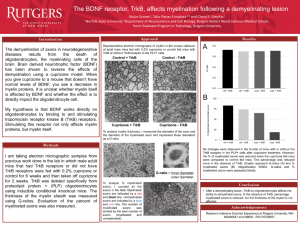Groves, Skylar: The BDNF Receptor, Trkb, Affects Myelination Following a Demyelinating Lesion
Title: The BDNF Receptor, Trkb, Affects Myelination Following a Demyelinating Lesion
Name: Skylar Groves
Home Institute: Norfolk State University
Programs: RISE program, Summer Undergraduate Research Fellowship (SURF) at Ernest Mario School of Pharmacy
Other contributors: Cheryl Dreyfus and Talia Planas-Fontánez
Abstract: Demyelination of axons in neurodegenerative diseases results from the death of oligodendrocytes, the myelinating cells of the brain. Brain derived neurotrophic factor (BDNF) has been shown to reverse the effects of demyelination using a cuprizone model. When you give cuprizone to a mouse that doesn’t have normal levels of BDNF, you see a decrease in myelin proteins. It is unclear whether myelin itself is affected by BDNF and whether the effect is to directly impact the oligodendrocyte cell. The hypothesis is that BDNF works directly on oligodendrocytes by binding and stimulating the tropomyosin receptor kinase B (TrkB) receptor, and that it not only affects myelin proteins, but myelin itself. I am taking electron micrographic samples from previous work done in the lab in which male adult mice that had TrkB receptors or did not have TrkB receptors were fed with 0.2% cuprizone or control for 6 weeks and then taken off cuprizone for 2 weeks. TrkB was deleted specifically from proteolipid protein + oligodendrocytes using inducible conditional knockout mice. The thickness of the myelin sheath was measured using G-ratios. Evaluation of the percent of myelinated axons was also measured. Preliminary data obtained this summer indicated that there was no change in the thickness of the myelin sheath when control or cuprizone samples with or without TrkB were compared. On the other hand, the percent of myelinated axons was reduced when the cuprizone samples were compared to control samples. There was a further reduction in myelinated axons when TrkB was deleted. TrkB on oligodendrocytes appears to regulate the percent of myelinated axons following a cuprizone lesion and affects the ability to remyelinate axons. Supported by the Research Intensive Summer Experience at Rutgers University, NIH NS036647 and NMSS: RG170728557.
Biography: Skylar Groves is a rising junior at Norfolk State University, majoring in Chemistry. Through the RISE/SURF Program at Rutgers University she was able to work in Dr. Cheryl Dreyfus’ Lab to examine the role of TrkB on myelination following a demyelinating lesion. In her free time, Skylar enjoys reading, writing, and exercising. She hopes to find a career in which she can combine her interests of neuroscience, toxicology and pharmacology, medicine, and forensics.
